By Udora Orizu
“The time for rhetoric is over. We need concrete action that reflects a true partnership of equals. Nigeria, and indeed Africa, is ready. We ask the EU to join us in building this shared, prosperous future,” – Rt Hon. Benjamin Kalu
From positively showcasing the nation’s achievements and fostering partnerships with foreign leaders and relevant stakeholders, the Deputy Speaker of Nigeria’s House of Representatives, Rt Hon. Benjamin Kalu through his participation in international forums with foreign governments is steadily advancing Nigerian, as well as African, interests in global problem solving, towards building a shared, mutually beneficial prosperous future.
His participation in the ongoing high-level EU-African Union meeting in Brussels, Belgium to strengthen ties and reinvigorate the partnership between the two continents, demonstrated Kalu’s adeptness at engaging with global leaders and pushing Africa’s interests.
The Deputy Speaker who chairs the Monetary and Financial Affairs Community of the Pan African Parliament (PAP) led a delegation to the European Parliament, availing himself of the platform provided by the forum, to market Africa as a continent poised for innovation and robust investments.
Delivering his address during the Online Roundtable themed, ‘EU-African relations: an African perspective’, Kalu engaged European policymakers and stakeholders on advancing cooperation, democratic governance, and development frameworks that reflect Africa’s voice more prominently on the global stage.
In what can be described as a ‘tour de force’, captivating address, the Deputy Speaker’s words resonated deeply with the audience, inspiring change and deep reflection.
He tasked them to move beyond the historical paradigms of donor-recipient and resource supplier-consumer, stressing that the future demands a partnership of equals, built on mutual respect, shared economic interests, and a collective vision for sustainable prosperity.
Speaking on several thematic areas, the Nigerian lawmaker opined that the solution was “not for Africans to migrate to Europe, but for European industry, technology, and capital to migrate to Africa.”

On political and democratic landscape – Kalu noted that the continent presents a mixed but dynamic political picture.
Acknowledging the EU’s efforts to support democracy through aid and dialogue, He however said for this support to be effective and welcomed, it must be demand-driven, not prescriptive and must respect our sovereignty and support endogenous reform processes rather than imposing external blueprints.
He therefore called for a genuine partnership with the EU supporting the strengthening of our democratic institutions: parliaments, judiciaries, and electoral commissions, and engage in political dialogue that respects our context.
On security, Kalu proposing an African-Led, EU-Supported Architecture, noted that as Europe’s closest continental neighbour, the security of both continents was inextricably linked.
He said, “The instability in the Sahel, Libya, the Great Lakes, and Mozambique has direct implications for Europe, primarily through migration and the spread of transnational crime. Therefore, a stable Africa is in Europe’s direct strategic interest.
“We propose a fundamental shift toward an African-led, EU-supported security framework. The EU’s most effective role is not as a combatant, but as a strategic enabler. This means selling, not just donating, the necessary kinetic equipment to sovereign nations like Nigeria. Access to advanced platforms like Italian UAVs and German Eurofighter Typhoon jets is pivotal for gaining air superiority and conducting effective reconnaissance against groups like JNIM and ISIS in the Sahel.
“The EU should channel its support through established African-led security structures. This includes: Funding the ECOWAS Standby Force and its crucial logistics base in Lungi, Sierra Leone, to enhance regional rapid response capabilities. Supporting the AU Peace Fund, which is the continent’s primary financial mechanism for peace and security operations. Backing the AU’s strategic assets, such as its naval base in Douala, Cameroon, and acknowledging Nigeria’s key role, demonstrated by our recent agreement to provide strategic sealift services to the AU.”
Speaking on migration, the Deputy Speaker recalled that post-colonial migration patterns were shaped by Europe’s labour needs, drawing from former colonies which created pathways, but also the beginnings of a human capital imbalance.
According to him, “Migration is not an “exodus” of the poor, but often a flight of Africa’s best and brightest, driven by a lack of opportunity at home. Since 1990, Africa has lost an estimated 20,000 professionals annually: doctors, engineers, academics, to developed nations. The economic cost is staggering. Africa spends $4 billion every year to hire approximately 100,000 foreign expatriates to fill the gaps left by its own departed talent. This is a direct transfer of wealth from a developing continent to the developed world.
“The gain for the West is Africa’s loss. Canada, for instance, saved an estimated $400 million by recruiting African-trained doctors, while the US saved nearly $4 billion from the migration of just 21,000 Nigerian doctors in the 1990s. This is not sustainable. It cripples our healthcare and educational institutions and perpetuates a cycle of dependency.”
Kalu therefore proposed “Nearshoring”, Business Process Outsourcing, and Industrialization concept.
His view, “The most effective migration policy is a robust industrial policy. We must shift from managing migration to eliminating its primary driver: the lack of high-value jobs. European companies should establish manufacturing hubs and processing plants in Africa. This strategy of “nearshoring” or “value chain localization” creates a win-win scenario.”
On educational and cultural exchange, Kalu said colonial education systems were often designed to serve administrative needs rather than fostering indigenous innovation or critical thought, in some cases actively limiting access to higher education.
Commending EU initiatives like the €27 million Intra-Africa Academic Mobility Scheme and the €19.9 million museum partnership initiative, he however noted that the best African Studies centres are still predominantly in Europe and North America, a direct consequence of the academic brain drain.
Proffering solution, he said, “Our partnership must move beyond mobility schemes to co-investing in African universities and research institutions, making them globally competitive hubs of knowledge. On culture, we must embrace the vision of thinkers like Achille Mbembé, who calls for interrogating Eurocentric narratives and reclaiming the agency of African societies. This means moving forward on the restitution of cultural artifacts and co-creating new narratives that reflect our shared, complex history. A true partnership involves Europe helping Africa build the institutional capacity to educate, retain, and empower its own talent.”
On trade, Kalu said “The colonial model established Africa as a source of primary products: cocoa, crude oil, uncut diamonds, and raw minerals. These were extracted, processed in Europe, and sold back to us as finished goods at a massive premium. While the EU is Africa’s largest export partner, the fundamental structure of our trade remains skewed. In 2023, EU exports to Africa were €170.14 billion, while imports from Africa were €196.32 billion. This slight surplus for Africa is misleading, as it is largely driven by fuel and raw mineral exports, not value-added goods. We export raw cobalt and import batteries. We export crude oil and import refined petroleum. This model traps Africa at the bottom of the global value chain.
“The future of EU-Africa trade must be built on local value addition. Instead of exporting raw lithium, we should partner to build battery gigafactories in the DRC, Nigeria, and Zambia. Instead of exporting raw cocoa, we should be home to the world’s leading chocolate manufacturers. Africa’s vast renewable energy potential, our solar and wind resources are thousands of times greater than the EU’s needs, and can power this new industrial base sustainably, aiding Europe’s green transition. This approach transforms our trade relationship from one of dependency to one of genuine partnership, where both continents benefit from the creation of higher-value products.”
Concluding the impactful address, the Deputy Speaker opined that to strengthen EU-Africa relations, we must be honest about the structural imbalances that persist.
The solutions, according to him are not more aid or stricter border controls, but bold, strategic, and mutually beneficial industrial investment in Africa.
In his words, “Let us work together to build factories, not fences. Let us catalyze trade that adds value on both sides of the Mediterranean. Let us create a future where Africa’s greatest export is not its people, but the innovative products and services they create. This is the African perspective. It is a perspective of ambition, of partnership, and of a shared destiny. The time for rhetoric is over. We need concrete action that reflects a true partnership of equals. Nigeria, and indeed Africa, is ready. We ask the EU to join us in building this shared, prosperous future.”!!!
*Orizu is SA Press Affairs to the Deputy Speaker



